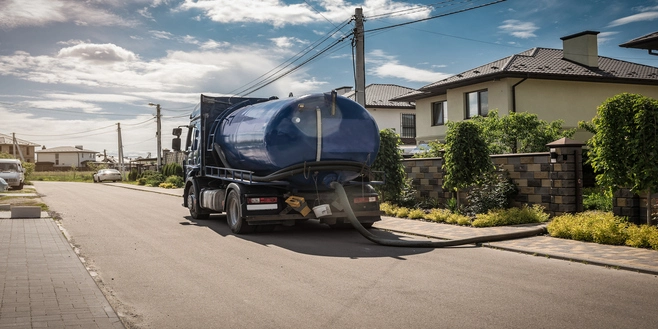
It’s Time to Talk About Septic Tank Maintenance
Today, Mr. Rooter Plumbing of Virginia Beach is going to discuss a messy topic few homeowners prefer to avoid thinking about but would be remiss to ignore altogether. That’s right: we’re going to talk about septic tanks. More specifically, we’re going to detail how a septic tank works, how often it should be pumped, and what maintenance services it should regularly receive.
A septic tank is an eco-friendly and natural solution for managing everyday drain waste. However, unlike plumbing systems that link up to the public sewage system, a septic tank requires extra care and maintenance. Proactively maintaining a septic tank and consistently pumping waste will help keep the system in top condition and prevent pricey emergencies.
Failing to Pump a Septic Tank Can Prove Dangerous & Costly
Most resources and guidelines recommend pumping septic systems every 2-5 years. Obviously, this is a broad time range. And truth be told, it isn’t necessarily accurate for every septic tank. The best way to keep a septic tank operating smoothly and effectively is to cater to its specific needs. Regularly monitoring the solid sludge and greasy scum accumulating in your tank is the best way to know when the time is nigh.
Septic tanks rely on gravity to naturally separate wastewater into three sections:
- Heavy, solid sludge sinks to the bottom
- Lighter, greasy scrum floats to the top
- An effluent mixture marbles in the middle
When operating effectively, the solids and greases should remain while the watery mixture releases into a drain field. Unfortunately, too much sludge and scum can accumulate over time and eventually seep into the effluent mixture. This scenario can cause the drain field to become backed up – causing hazardous, unhealthy conditions and wastewater clogs. We recommend regularly pumping your septic tank to ensure it performs smoothly and to avoid fumes, bacteria, and blockage.
Pumping Too Often Can Be Expensive & Problematic, Too
Pumping a septic tank to clear small amounts of sludge and scum can become pricey over time. It is best to survey your septic tank’s conditions and levels to avoid wasting money. Nobody wants to request services more often than is necessary.
A sterile septic tank can also be counterproductive. Believe it or not, the bacteria in the sludge and scum are a critical part of its processes: A septic tank relies on anaerobic digestion to organically decompose waste for each filtration layer. A healthy number of bacteria is thus essential for optimal function. Pumping a septic tank can lower healthy bacteria levels (as sludge expels into the drain field) – causing clogs and tank failures. It can take up to a month until the mixture regains optimal performance.
Telltale Signs It Is Time to Pump Your Septic Tank
It is wise to wait until the sludge and scum in your septic tank reach a certain threshold before pumping. But how might you know when your septic tank is in homeostasis? How do you know when it is overwhelmed by sludge and scum? We understand you might be puzzled by this question. Luckily, we’re ready to outline some clear indicators your septic system is ready to be pumped.
Look for Pooling Water & Excessively Green Vegetation
Be on the lookout for unusual puddles of water pooling water near or around the drain field of your septic system. Unexplained water can result from a clogged piping system under the drain field. This scenario is common when a tank reaches capacity or becomes backed up with too much solid waste, causing it to overflow. It is also wise to be wary of unnaturally green grass near or above your septic tank bed. Excessively lush and vibrant grass often signals an underground leak.
Sniff for Unpleasant Odors
A septic system consists of black wastewater (from toilets) and gray water (from dishwashers, showers, laundry machines, etc.). This dirty mixture can smell extremely foul and unpleasant. It is probably time for maintenance if you notice a highly malodorous scent every time you approach your septic tank area. Nobody wants to be the reason the whole neighborhood is plugging its nose. Reach out to a professional team without delay!
Check for Slow Moving Drainage & Sewage
A variety of plumbing issues can cause clogged drains and sewer obstruction. Whatever the reason, reach out to Mr. Rooter Plumbing of Virginia Beach for expert unclogging solutions. We utilize state-of-the-art equipment, professional techniques, and years of experience to fix plumbing problems quickly and affordably. We’ll be able to troubleshoot the entire plumbing system with hi-tech cameras and let you know how we can most effectively rectify the clogged septic tank or plumbing issue. Bottom of Form
It TheySeptic tanks are an excellent all-natural wastewater solution. They are not only green but can save property owners money by eliminating local sewer charges. Just be mindful of what debris, waste, chemicals, and products you flush down your drain. After all, everything will end up in the tank. Fortunately, your septic tank should enjoy a sustainable and durable lifespan if you flush only biodegradable products, pump your wastewater at the proper intervals, and call a pro to perform regular maintenance.
Want more information on how to maximize your septic tank’s condition? Call today!

